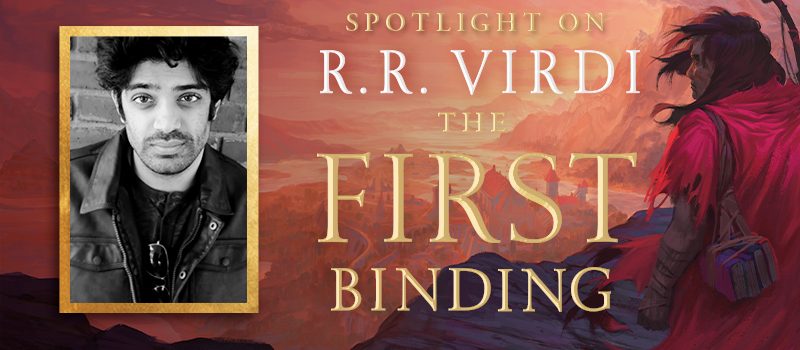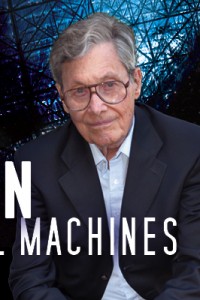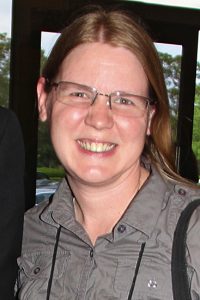Spotlight on: R.R. Virdi
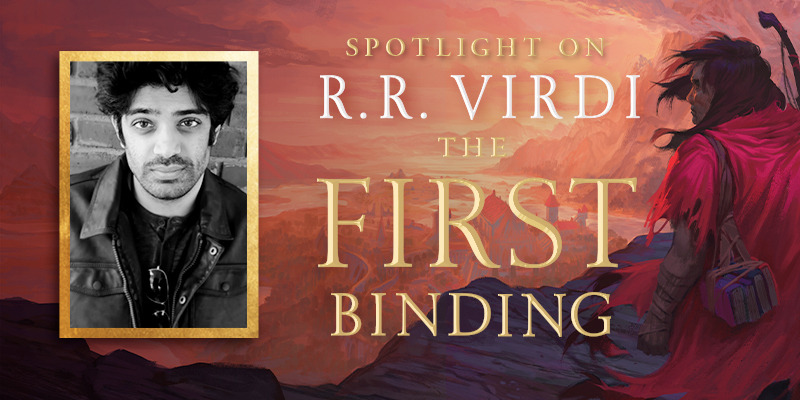
R.R. VIRDI is a two-time Dragon Award finalist and a Nebula Award finalist. He is the author of two urban fantasy series, The Grave Report, and The Books of Winter. He was born and raised in Northern Virginia and is a first generation Indian-American with all the baggage that comes with. He’s offended a long list of incalculable ancestors by choosing to drop out of college and not pursue one of three pre-destined careers: a lawyer, doctor, engineer. Instead, he decided to chase his dream of being an author. His family is still coping with this decision a decade later.
Q: Tell us about your latest novel, The First Binding: the world where it takes place, and the people who inhabit that world.
The First Binding primarily takes place in the Mutri Empire (book one, at least), which is an analog of South Asia if it had been birthed in another world with different origin myths behind it, and allowed to evolve to the current state it’s in. South Asian readers will see and, more importantly, feel many similarities while also noticing a breath of new fresh air in how some cultural things are changed, interpreted, and play roles in daily life.
For most people, caste plays a huge role and is part of normal life. It’s never talked about in a taboo way or anything to be ashamed of, per se, but rather an accepted reality of all people’s lives. It can offer you privileges, or give you something to be concerned about depending on whom you’re dealing with. It can lead you to be denied company, services, opportunities or…get you into trouble. An unfortunate harshness of the time and world in which Ari (the protagonist) lives.
Q: The First Binding launches The Tales of Tremaine series. Can you give us hints about what the future of the series holds?
The series is focused on being a grand adventure fantasy series. A South Asian Odyssey, or the journeys of Marco Polo, all layered with storytelling—nesting stories that reveal the history of the world and maybe more. After all, sometimes stories are more than just entertainment.
Q: You’re a prolific and accomplished writer, with Dragon and Nebula Award nominations, and multiple books and series. Can you describe your journey from aspiring writer to multiply-published author?
It’s all been a bit of a blur. Everyone’s heard the starving artist thing, and that’s certainly been me. In some ways, I suppose it still is. I published my first novel, Grave Beginnings, back in 2013 in ebook format only. The paperback came years later, but I’d been writing other projects since, sharpening my skills and trying new things. By 2016, Grave Measures was published. The sequel landed on the inaugural Dragon Award ballot and changed things for a while. The awards were covered by The Verge, which brought a lot of attention to me and my sales for a long while. But all that did was fuel me to keep writing, so I did. Honestly, it’s a story of being in the trenches. I’d like to have something romantic to say about it, but it was hard. There was a lot of self-doubt, dealing with judgment at the time, as there was a good deal more of looking down on indie authors during the years of 2013-2018 (at least for me and interactions I’d had), and all keeping my nose to the grind stone all the while. The good thing about it is that it instilled a work ethic in me. Quite possibly a workaholic one. I know some have accused me of that. But I’ve written nearly one million indie published words alone, and nearly that much to be traditionally published. It’s been a help, but it’s also made the journey hard to remember.
I suppose I now get why actors struggle answering questions about movies when, by the time of interviews and the movie is coming out, they’ve filmed another two projects.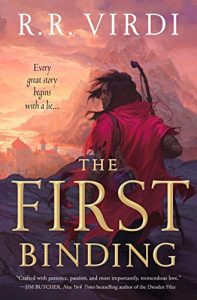
Q: You’re also a hybrid author, publishing with large and small presses, and also self-publishing some work. What are the big pluses and minuses of both? Are there things traditional publishing could learn from indie authors?
Indie allows for a lot more mobility and reading the terrain of what’s going on, in my humble opinion. There’s also the freedom to write whatever you want—the true uncompromising vision of your book. That matters to some. Others, not so much. That’s a touchy subject for some I’ve spoken to. But I certainly enjoyed the ability to pause work on a project and do something else to either improve my skills, flex different creative muscles, or just help myself counter some burn out.
The downsides of indie are that a lot of people could benefit from going into it with a war chest of funds. But that’s not easy to do, especially in my case and starting in my young twenties. It can make it hard to market, get the right resources for editing, covers, and more. Still, I wouldn’t have changed my journey or my indie books for anything. I’m glad I started there, and I intend to continue indie pubbing things when and where I can.
Traditional obviously has the big advantage of houses to throw their weight behind your projects if they choose, the advances, and an existing presence and the fanbases of their prior authors to help leverage and crossover with you. It is a coin toss though if that’ll all go your way. I’d like to say deadlines can be a bit of a minus, but in my experience, I’ve had extremely understanding, kindly, and patient editors. The pandemic, life/family stuff, and other emergencies forced me to take months extra on book two. My editors had no problems with it.
I do think traditional is still a bit behind the curve on marketing tactics indies use and paying attention to market trends and what’s selling and what’s hot. But that’s just an opinion. But I hope in the future the traditional industry will be more open to certain genres and trends rather than just assuming they’re not popular because people in the industry aren’t interested in them. It is a closed loop system. So, insider interest does not equal reader/fan interest. I think that gets forgotten or overlooked.
Q: You’ve written roleplaying game-inspired portal fantasies, space Westerns, urban fantasies, and now epic fantasy. What writers, inside and outside the genre, influenced you?
Jim Butcher, Patricia Briggs, Paulo Coelho (whose The Alchemist I will ALWAYS cherish), Neil Gaiman, Ursula K. Le Guin, Patrick Rothfuss, Stephen King, R.A. Salvatore, Gabriel Garcia Marquez, Carlos Ruiz Zafon, George R.R. Martin, are the ones that immediately come to mind. This is not counting obviously manga authors who had anime adaptations of their works. I’m a 90’s kid, so anime was both formative and a religious experience.
Q: As a first-generation Indian-American author raised in Virginia, “with all the baggage that comes with” (as you’ve said elsewhere), how did your upbringing impact your writing?
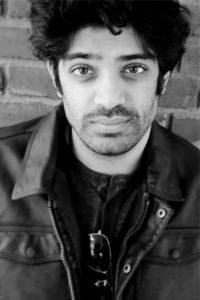
Hooo boy. What can I say that won’t have my ancestors’ ghosts rallying to beat me with a slipper? Well, growing up in Northern Virginia had me surrounded by a good amount of kids whose parents owned muscle cars. Between that and working on my dad’s car when I was young saw that I’d develop a huge love for everything automotive. Any contemporary setting work I have will have either a reference to a car joke, a car, or feature some kind of vehicle that I bother to go into detail about at least once and make a commentary on. It’s just who I am.
My upbringing also had me grow up with a foot in both worlds as it were. My parents predominantly spoke Hindi at home, and a good amount of Punjabi. I didn’t learn English until I was put into Montessori, a sort of school-before-pre-school, and learned to speak it there on the fly. At home, Bollywood movies played, and for the longest time I didn’t have my own TV or any access to American programming until maybe I was a bit into elementary school. So, I watched my dad watch Kabaddi (Indian wrestling) matches, or classic movies. At the time, I wanted nothing to do it with it of course.
Now it’s all come full circle and all those memories, mythology or spooky stories my parents told me from my culture have come up to the surface and seep into my newest series, albeit spun anew for it.
I’ve definitely also gone through odd feelings of not quite belonging where I was born, but the same for India. A South Asian friend said it best to describe the pair of us: we’re too western for the east by dint of our upbringings and things we were exposed to, but we’ll always be too eastern for the west because of how we look and our ancestry. It definitely affects your identity, and sometimes people on either side will hold you to odd purity metrics you have to hit to “qualify.” So themes of belonging do enter into my stories now that I think about it.
Q: Is there anything else you’d like our readers to know? Upcoming work or other projects of note?
Well, I know these are chonky books, so everyone should know that book two’s draft has already been turned in. So there is that. J I’ll be setting out to work on the fourth novel in my urban fantasy series, The Grave Report, pretty soon, and past that, there’s nothing more in the works besides the eventual book three in Tales of Tremaine. They’re massive books, so they’ll obviously be the focus of my time. Books 1-3 will be close to a million words in print if not a touch over.
That’s one heck of a commitment.


